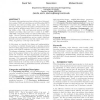Free Online Productivity Tools
i2Speak
i2Symbol
i2OCR
iTex2Img
iWeb2Print
iWeb2Shot
i2Type
iPdf2Split
iPdf2Merge
i2Bopomofo
i2Arabic
i2Style
i2Image
i2PDF
iLatex2Rtf
Sci2ools
128
click to vote
EUROSYS
2007
ACM
2007
ACM
Thread clustering: sharing-aware scheduling on SMP-CMP-SMT multiprocessors
The major chip manufacturers have all introduced chip multiprocessing (CMP) and simultaneous multithreading (SMT) technology into their processing units. As a result, even low-end computing systems and game consoles have become shared memory multiprocessors with L1 and L2 cache sharing within a chip. Mid- and large-scale systems will have multiple processing chips and hence consist of an SMPCMP-SMT configuration with non-uniform data sharing overheads. Current operating system schedulers are not aware of these new cache organizations, and as a result, distribute threads across processors in a way that causes many unnecessary, long-latency cross-chip cache accesses. In this paper we describe the design and implementation of a scheme to schedule threads based on sharing patterns detected online using features of standard performance monitoring units (PMUs) available in today’s processing units. The primary advantage of using the PMU infrastructure is that it is fine-grained (down to...
Cache Line | Cross-chip Cache Accesses | EUROSYS 2007 | Performance Monitoring Units | System Software |
| Added | 10 Mar 2010 |
| Updated | 10 Mar 2010 |
| Type | Conference |
| Year | 2007 |
| Where | EUROSYS |
| Authors | David K. Tam, Reza Azimi, Michael Stumm |
Comments (0)

